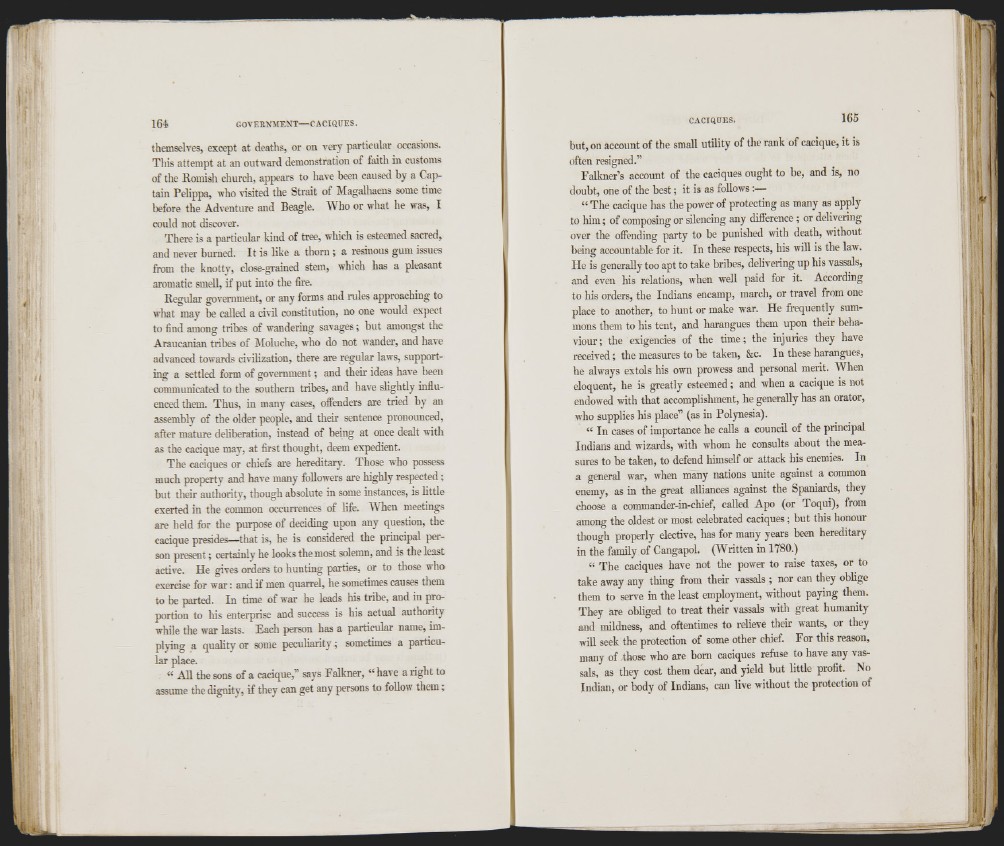
themselves, except at deaths, or on very pai-ticular occasions.
This attempt at an outward demonstration of faith in customs
of the Romish church, appears to have been caused by a Captain
Pelippa, who visited the Strait of Magalhaens some time
before the Adventure and Beagle. M ho or what he was, I
could not discover.
There is a particular kind of tree, which is esteemed sacred,
and never burned. I t is like a thorn ; a reauous gum issues
from the knottv, close-grained stem, which has a pleasant
aromatic smell, if put into the fire.
Reofidar c^vernment, or any forms and rules approaching to
what may be called a civil constitution, no one would exjiect
to find among tribes of wandering savages; but amongst the
Araucanian tribes of IMoluche, who do not wander, and have
advanced towards civilization, tliere are regular laws, supporting
a settled form of government; and their ideas have been
communicated to the soutliern tribes, and have shghtly influenced
them. Thus, in many cases, offenders are tried hj' an
assembly of the older people, aud their sentence pronounced,
after mature dehberation, instead of being at once dealt with
as the cacique may, at first thought, deem expedient.
The caciques or chiefs are hereditary. Those who possess
much property and have many followers are highly respected;
but their authority, though absolute in some instances, is little
exerted in the common occurrences of life. M hen meetings
are held for the purpose of deciding upon any question, the
cacique presides—that is, he is considered the principal person
present; certainly he looks the most solemn, and is the least
active. He gives orders to hunting parties, or to those who
exercise for war: and if men quarrel, he sometimes causes them
to be parted. In time of war he leads his tribe, and in proportion
to his enterprise and success is his actual authority
while the war lasts. Each person has a particular name, implying
a quality or some pecuhanty; sometimes a particular
place.
« AU the sons of a cacique,” says Falkner, “ hare a right to
assume the dignitv, if they can get any persons to foUow them;
■in
but, on account of the small utility of the rank of cacique, it is
often resigned.”
Falkner’s account of the caciques ought to be, and is, no
doubt, one of the best; it is as follows:—
“ The cacique has the power of protecting as many as apply
to him; of composing or silencing any difference ; or delivering
over the offending pai'ty to be punished with death, without
being accountable for it. In these respects, his will is the law.
He is generaUy too apt to take bribes, delivering up his vassals,
and even his relations, when well paid for it. According
to his orders, the Indians encamp, march, or travel from one
place to another, to hunt or make war. He frequently summons
them to his tent, and harangues them upon their behaviour;
the exigencies of the time; the injuries they have
received; the measures to be taken, &c. In these harangues,
he always extols his own prowess and personal merit. When
eloquent, he is greatly esteemed; and when a cacique is not
endowed with that accomphshment, he generally has an orator,
who supplies his place” (as in Poljuiesia).
“ In cases of importance he calls a council of the principal
Indians and wizards, with whom he consults ahout the measures
to be taken, to defend himself or attack his enemies. In
a general war, when many nations unite against a common
enemy, as in the great alliances against the Spaniards, they
choose a commander-in-chief, called Apo (or Toqui), from
among the oldest or most celebrated caciques; hut this honour
though properly elective, has for many years been hereditary
in the family of Cangapol. (Written in 1780.)
“ The caciques have not the power to raise taxes, or to
take away any thing from their vassals ; nor can they oblige
them to serve in the least employment, without paying them.
They are obhged to treat their vassals with great humanity
and mildness, and oftentimes to relieve their wants, or they
wül seek the protection of some other chief. For this reason,
many of those who are bom caciques refuse to have any vassals,
as they cost them dear, and yield but little profit. No
Indian, or body of Indians, can live without the protection of
IH'*IK